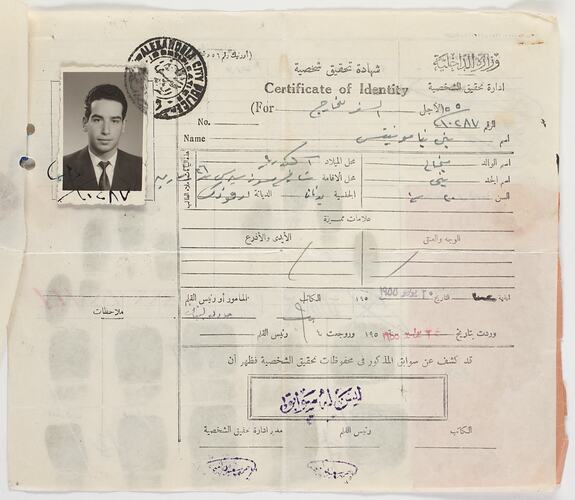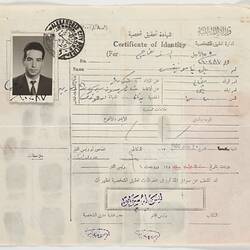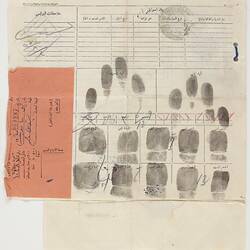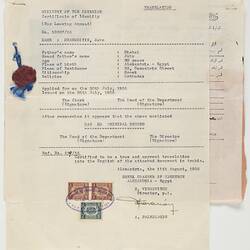Summary
Identity document issued to the John Neamonitis in Alexandria, Egypt on 25 July 1955 as part of the process of immigrating to Australia.
John was born in Egypt to Greek parents, and spent much of his childhood feeling like an outsider. At the age of 20, in the face of strong opposition from his father, he decided to migrate. John was sponsored by his great uncle Stephanos Tsikleas to come to Australia. Initially living in Rockhampton, John quickly found life dull, however his uncle persuaded him to try other Australian cities before retuning to Egypt and after walking off the train in Melbourne, John decided this was a city he could live in. John sent for his fiance Despina, who was also keen to leave Egypt and the couple married in Melbourne in 1956. John found work as a mechanic, first for Preston Motors, then Commonwealth Motors, before establishing his own business Paris Motors in 1967. In the late 1950s John received Australian citizenship, finally achieving his much desired statehood and sense of belonging.
Physical Description
'Certificate of Identity' printed on cream paper, with photo of donor attached. Ink stamped 'Alexandria city'. Document printed and completed in Arabic. Reverse side includes another section (in Arabic) not completed, and left and right handprints of the donor. Pink printed slip attached, probably a payment receipt. Stapled to front of identity document is a typed sheet translating the document into English. Headed 'Ministry of the Interior Certificate of Identity (for leaving abroad)'. Includes family, birth and other personal details, date of application and its issue and clear statement that applicant 'has no criminal record'. The two documents are stapled together at top left hand corner and also tied together with blue string and a red wax seal.
Significance
Historical Significance: This document represents a fascinating migration story - of desire for statehood and belonging, of the spirit of courage and adventure in the search for a better life, and of the continuing reverberations of decisions to migrate, whereby those left behind experience separation, and loss; and those who leave, guilt, pain and initial regret. As most of the immigration documents in the collection are in English, and none are in Arabic, this document diversifies the cultural representation of the collection. Of particular interest are the handprints, which provide a powerful symbol of identity, as well as the extra demands placed on selected migrants by Australian authorities.
More Information
-
Collecting Areas
-
Acquisition Information
Donation from Mr. John Neamonitis, 23 Mar 2005
-
Issued To
-
Issued By
-
Inscriptions
Translated sheet: TRANSLATION/MINISTRY OF THE INTERIOR/Certificate of Identity/(For Leaving Abroad/No. 10287/55/NAME : NEAMONITIS, John Wax seal: E.E.E.
-
Classification
Migration, Processing - planning & departure, Identification
-
Category
-
Discipline
-
Type of item
-
Overall Dimensions
25.7 cm (Length), 22.1 cm (Width)
Measurements taken of original document only, not translated sheet.
-
Overall Dimensions
260 mm (Width), 278 mm (Height)
Total dimensions - both parts of document together
-
Keywords
Arabic Language, Greek Communities, Greek Immigration, Identifications, Immigration, Immigration Policies



